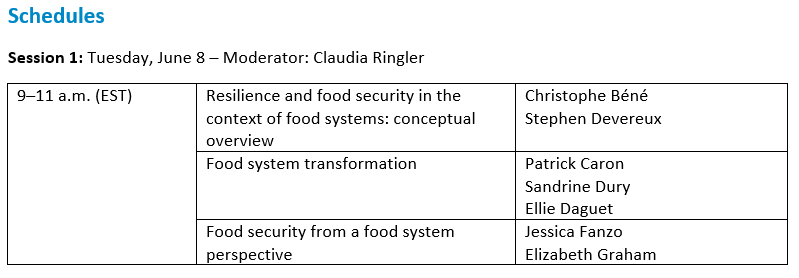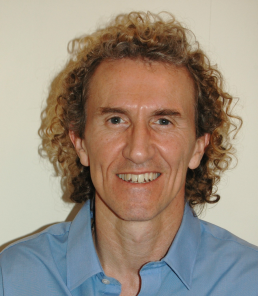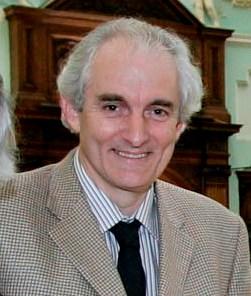E-Conference on Resilience & Food Security in a Food Systems Context

Note: The Alliance of Bioversity International and CIAT is not the organizer of this e-conference. We are facilitating our channels to promote the event at request of Dr. Chris Béné, an Alliance scientist and one of the e-conference co-hosts.
June 8, 9, 15 and 16, 2021
Time (each day)
9 a.m. – 11 a.m. (Washington, DC – EST)
2 p.m. – 4 p.m. (London – EST+5)
8 a.m. – 10 a.m. (Bogotá – EST-1)
About the e-conference:
Food systems researchers, practitioners and others are invited to participate to an e-conference on Resilience, Food Security and Food Systems, to be held in four sessions on June 8, 9, 15 and 16. Each 2-hour session will discuss three draft chapters of the book “Resilience and food systems in the context of food systems,” edited by Chris Béné (Alliance of Bioversity International and CIAT) and Stephen Devereux (Institute of Development Studies) and to be published by Palgrave MacMillan in 2022.
This international event offers participants the opportunity to be presented with – and to comment on – the draft chapters of the book as it is currently being written by a group of leading scholars on resilience, food security and food systems.




About the speakers
|
Christopher Barrett is Stephen B. & Janice G. Ashley Professor of Applied Economics and Management, International Professor of Agriculture at the Charles H. Dyson School of Applied Economics and Management as well as a professor in the Departments of Economics and of Global Development, and a fellow of the Cornell Atkinson Center for Sustainability, all at Cornell University. He is an elected fellow of the American Association for the Advancement of Science, the Agricultural and Applied Economics Association, and the African Association of Agricultural Economists.
|
|
Jane Battersby-Lennard is an urban geographer with an interest in all things food related. Her current areas of particular interest are urban food systems, urban food policies and the construction of food security theory in Northern and Southern research contexts. This work has both theoretical and applied components. Underpinning her food work is an ongoing interest in the linkages between spatial transformation and identity transformation in post-apartheid urban areas – a topic she has addressed through the lenses of youth identities, education, music and land restitution. She has been the Cape Town Partner of the African Food Security Urban Network (AFSUN) since 2008. She is currently the Research Coordinator of the ACC’s Consuming Urban Poverty Project, is associated with the Hungry Cities Programme, and is the PI of the Nourishing Spaces project. Jane is the Premio Daniel Carasso 2017 laureate. She is actively engaged in international, national, provincial and local government policy process, having acted in an advisory or consultative position at these levels, and currently a member of the South African Vulnerability Assessment Committee (SAVAC). Jane serves on the advisory boards of several international research projects.
|
|
Chris Béné is Senior Researcher at the Alliance of Bioversity International and CIAT, a member of CGIAR. He has 20+ years of experience conducting inter-disciplinary research and advisory work in different parts of the world (Africa, Asia, Pacific), focusing on poverty alleviation, food security, and more generally low-income countries’ economic development. In his career, he has worked on a wide range of topics, including natural resource management, analysis of policy and science-policy interface, resilience (measurement), and more recently food system.
|
|
Elizabeth Bryan, a Senior Scientist in IFPRI’s Environment and Production Technology Division, conducts policy-relevant research on gender, sustainable agricultural production, climate-smart agriculture, small-scale irrigation, and natural resource management. She has considerable experience integrating gender into large, interdisciplinary research programs. Elizabeth is skilled at using quantitative and qualitative methods for gender research and has published numerous articles based on this work. She regularly presents research results to diverse audiences, including at policy workshops, trainings, and international conferences.
|
|
Patrick Caron is a specialist in livestock raising systems and territorial dynamics, and has worked on analysing the role of the territory in rural transformations, with a focus on Brazil, Southern Africa and the Middle East. He has been at CIRAD since 1988 where he was Deputy General Director for Research and Strategy from 2010 to 2016. He chairs the AgroParisTech Scientific Committee and is a member of the National Council for Development and International Solidarity. In 2015 he was appointed President of the High Level Panel of Experts (HLPE) of the United Nations Committee on World Food Security (CFS).
|
|
Mark Constas is an associate professor in the Charles H. Dyson School of Applied Economics and Management at Cornell University and an international professor of agriculture and life sciences. As a fellow of the Atkinson Center for Sustainable Future, he maintains an interest in theories and practices related to sustainability. As a specialist in impact evaluation and measurement, his research seeks to develop and test approaches to measure resilience, particularly in situations where households and communities are exposed to recurring shocks. The aim of this work is to understand the ways in which households and communities achieve and maintain well-being in shock-prone contexts. |
|
Alessandro (Alex) De Pinto joined the University of Greenwich in 2020 as Professor of Climate Change and Food Security at the Natural Resources Institute. He is an environmental and natural resource economist with more than 20 years of experience working in economically depressed areas. Dr. De Pinto has a Ph.D. in Agricultural and Consumer Economics from the University of Illinois at Urbana-Champaign, USA with a specialization in agricultural policies and environmental and resource economics. He has conducted research in Latin America, South Asia and sub-Saharan Africa with a focus on climate-smart agriculture, risk management, resilience and low emissions development strategies. Prior to the University of Greenwich, Dr. De Pinto was as Senior Research Fellow at the International Food Policy Research Institute (IFPRI) in Washington D.C. and was Assistant Professor of Economics at the University of Redlands in California. He has published extensively on issues related to climate change, food security, land use change and natural resources management in leading journals and has a broad experience engaging with foreign governmental agencies, government officials and ministries in the Global South.
|
|
Stephen Devereux is a development economist who works on famine, food security and social protection, with a focus on Africa. His work experience includes three years heading a Rural Research Programme at the University of Namibia and one year researching household drought responses in rural Ghana. He has been a Fellow of the Institute of Development Studies (IDS) at the University of Sussex since 1996, where he co-founded the Centre for Social Protection in 2005. In 2016 he was awarded a South Africa-UK Bilateral Research Chair in Social Protection for Food Security by the National Research Foundation (NRF) and the Newton Fund, affiliated to the DSI-NRF Centre of Excellence in Food Security and the University of the Western Cape in South Africa. |
|
Jessica Fanzo is the Bloomberg Distinguished Professor of Global Food Policy and Ethics at the Berman Institute of Bioethics, the Bloomberg School of Public Health, and the Nitze School of Advanced International Studies (SAIS) at the Johns Hopkins University in the USA. She also serves as the Director of Hopkins’ Global Food Policy and Ethics Program, and as Director of Food & Nutrition Security at the JHU Alliance for a Healthier World. From 2017 to 2019, Jessica served as the Co-Chair of the Global Nutrition Report and the UN High Level Panel of Experts on Food Systems and Nutrition. Her expertise focuses on the impact of transitioning food systems on healthy, environmentally sustainable and equitable diets, and more broadly on the livelihoods of people living in resource-constrained places.
|
|
Kathryn J. Fiorella is Assistant Professor at Cornell University in the Department of Population Medicine and Diagnostic Sciences and Master of Public Health Program, and Faculty Fellow of the Cornell Atkinson Center for Sustainability and the Center for Health Equity. An environmental scientist and epidemiologist, her research aims to understand the interactions among environmental change and livelihood, food, and nutrition security. Her work is focused on global fisheries and the households that are reliant on the environment to access food and income. She uses interdisciplinary methods and her work aims to foster a deeper understanding of how ecological and social systems interact, the ways communities and households adapt to and mitigate environmental change, and the links between human well-being and ecological sustainability. She holds a PhD in Environmental Science, Policy & Management and a Master of Public Health from the University of California, Berkeley, and an AB in Ecology and Evolutionary Biology from Princeton University.
|
|
Gareth Haysom has been a researcher in the food systems research grouping at the Africa Centre for Cities at the University of Cape Town since 2014, and associated with the African Food Security Urban Network (AFSUN) since 2011. His work uses food as a lens to investigate the dramatic transitions taking place in African and Southern cities. This focus connects the different stands of his past professional work and academic research. Food, food system challenges and everyday food system related questions offer a unique perspective into how Southern and African cities are changing, how urbanites navigate the urban everyday, the flaws in existing food system, unban system, policies, and how food intersects directly with poverty, inequality, spatial legacies, urban infrastructure, and urban economies. The premise motivating this work is that Africa’s future will be an urban one and a narrow window exists in which to respond to the specific needs of the varied urban forms and typologies before the future is cast in concrete. Gareth was the Southern country project leader lead for the Hungry Cities Partnership, a research project focusing on 8 cities across the global South, ending in 2020. He has been a co-investigator in the Consuming Urban Poverty, Nourishing Spaces and The Nourished Child projects.
|
|
John Hoddinott is a Canadian economist and the Howard Edward Babcock Professor of Food, Nutrition and Public Policy at Cornell University. From 2002 to 2015, he was a Deputy Division Director at the International Food Policy Research Institute. His research focuses on the causes and consequences of poverty, hunger and undernutrition in developing countries. John has also had involvement in discussions surrounding aid flows, responses to the 2008 food price crisis and reforms to the global food security architecture such as the Food Aid Convention.
|
|
Md Mofakkarul Islam is a Senior Fellow at the Natural Resources Institute (NRI) of the University of Greenwich. Previously, he held teaching and research positions at Nottingham Trent University, Scotland’s Rural University College, The Open University, Massey University, and Bangladesh Agricultural University. Mofa is an interdisciplinary social and behavioural scientist, with over 20 years of professional experience, working in the areas of global agriculture, food security, and development. His recent works have focused on indicators and metrics of sustainable agricultural intensification; household adaptation, vulnerability, and resilience relating to climatic and non-climatic hazards, and their implications for food security.
|
|
Pamela Katic is a senior economist at the Natural Resources Institute, University of Greenwich. An agricultural and environmental economics modeler, Pamela has 15+ years of experience in the implementation of research for development agricultural projects in developing countries. Her long-term research interests lie in the promotion of sustainable, inclusive and efficient agricultural water management technologies, policies and institutional investments and in water, food and energy nexus challenges. Pamela has a strong focus on accelerating transformations to global sustainability through research and innovation, co-chairs the Water-Energy-Food Knowledge-Action Network of Future Earth, sits at the UK committee of Future Earth and is a member of the Water Justice Hub.
|
|
Tim Lang is Professor of Food Policy at the Centre for Food Policy at City University of London, which he founded in 1994 and directed until 2016. He has been an advisor internationally to WHO, FAO, UNEP and nationally to several House of Commons Select Committee inquiries on food standards, globalisation and obesity, and a consultant on food security to the Royal Institute of International Affairs.
|
|
Karl-Axel Lindgren is a recent doctorate in Food Policy at the Centre for Food Policy at City University of London. He wrote his thesis on India’s 2013 National Food Security Act, critically analysing the narratives around urban food security among policy-makers, seeking to understand the extent that urban food security was considered and understood in the formulation of the Act. He has contributed one chapter in the book ‘Food Poverty and Insecurity: International Food Inequalities’ on the Right to Food in India, analysing the shift of entitlements from government responsibility to obligation.
|
|
Bruno Losch is a political economist at Cirad (Centre de Coopération Internationale en Recherche Agronomique pour le Développement – France) and professor at the University of the Western Cape, South Africa, where he leads the Food Governance and Policy programme of the Centre of Excellence in Food Security. He was previously co-director of the Centre for the Study of Governance Innovation (GovInn), South Africa, senior economist at the World Bank, and in charge of Cirad’s Family Agriculture Program. He has published extensively in the field of family agriculture, rural studies, territorial policies, and the political economy of development, with a particular focus on Africa, Central America and the Pacific.
|
|
Julian May is Director of the Centre of Excellence in Food Security at the University of the Western Cape and holds the UNESCO Chair in African Food Systems. He is an economist with a PhD in Development Studies. He has worked on options for poverty reduction including land reform, social grants, information technology and agriculture throughout Africa and in the Indian Ocean Islands. His current research focuses on food security, childhood deprivation and malnutrition. He has edited 6 books and published over 80 papers in books and academic journals. He has been an associate researcher at Oxford University, the University of Bergen, the University of Manchester and the International Food Policy Research Institute; and a visiting researcher at the London School of Hygiene and Tropical Medicine, Université de Paris and Vrije Universiteit-Amsterdam. He chairs the ‘Science for the Reduction of Poverty and Inequality’ standing committee of the Academy of Science in South Africa.
|
|
Claudia Ringler is Deputy Director of the Environment and Production Technology Division at the International Food Policy Research Institute (IFPRI). Her research focuses on global water and food security, gender-water and gender-climate change linkages, the synergies of climate change adaptation and mitigation and on the role of energy in transforming food systems.
|
|
Elizabeth Tennant is a Postdoctoral Associate in the Department of Economics at Cornell University. Her research uses integrated earth- and human-systems approaches to answer questions related to disaster risk reduction, climate adaptation, resilience and sustainable development. In recent work, she has studied how institutions, inequalities and other socioeconomic patterns shape our ability to absorb and recover from extreme events.
|
|
Joanna Upton is a Research Associate in the Charles H. Dyson School of Applied Economics and Management at Cornell. She focuses with her research and outreach on food security, food policy, and resilience in sub-Saharan Africa, and has a passion in particular for working on questions with policy-relevant applications. She works closely with a wide range of collaborators, including academics from diverse disciplines, CGIAR institutions, UN organizations, government agencies, think tanks, and non-profit organizations implementing programs in developing countries. Joanna also thrives on working with students and mentees, both in the classroom and in the field. |
E-conference hosted by:

Chris Béné:
c.bene@cgiar.org
Alliance of Bioversity International and CIAT

Stephen Devereux:
s.devereux@ids.ac.uk
Institute of Development Studies (UK)
Note:
This e-conference is devised as an academic forum to bring into light diverse enriching perspectives and, therefore, it will not entail for participants any copyrights or intellectual property rights over what is discussed therein nor in the book “Resilience and food systems in the context of food systems.”
